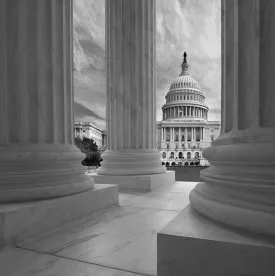Bills pending in Congress that would give FTC the authority it seeks.
The U.S. Supreme Court unanimously decided that the Federal Trade Commission (FTC) may not simultaneously seek injunctive relief for deceptive business practices and equitable monetary relief -- such as restitution or disgorgement -- from scammers and antitrust law violators. The Federal Trade Commission Act simply does not authorize this approach, the court held. The acting chair of the FTC and others immediately condemned the ruling, saying the court took away the Commission’s best weapon against scammers and unscrupulous businesses. But the court said it was interpreting the law as it is written (AMG Capital Mgmt., LLC v. FTC, Sup. Ct., No. 19-508; 2021 U.S. LEXIS 2108 *; __ S.Ct. __; 2021 WL 1566607).
A district court granted the FTC’s request under Section 13(b) of the Act for a permanent injunction to prevent a payday lender from scamming borrowers. The court relied on Section 13(b) in ordering the lender – former professional race car driver Scott Tucker and his company, AMG Capital Management – to pay $1.27 billion in restitution and disgorgement.
On appeal, the Ninth Circuit ruled in favor of the FTC, rejecting Tucker’s argument that the Act does not authorize awards of equitable monetary relief. AMG took the case to the Supreme Court which, on April 22, 2021, reversed the Ninth Circuit, unanimously concurring with Associate Justice Stephen G. Breyer’s majority opinion. While this may be a technical win for Tucker, he continues to serve a 16-year prison sentence for making illegal payday loans and racketeering.
Congress granted the FTC authority to fight against unfair or deceptive practices via administrative proceedings. It is only after these proceedings and after issuance of a cease-and-desist order may the FTC seek civil penalties. District courts may grant injunctions and “further equitable relief” to enforce final orders. The Act also authorizes district courts to grant relief necessary to redress injury to consumers when someone has committed unfair or deceptive acts barred by a cease-and-desist order. But where Section 13(b) authorizes injunctive relief, monetary relief falls under Section 5 and Section 19. In this case, the Supreme Court essentially held, the FTC jumped the process, seeking both permanent injunctive relief and equitable monetary relief directly from a district court before exhausting administrative proceedings.
Justice Breyer wrote that with Section 5 and Section 19, Congress gave district courts the authority to “impose limited monetary penalties and to award monetary relief in cases where the Commission has issued cease and desist orders, i.e., where the Commission has engaged in administrative proceedings.” Since these provisions explicitly provided for “other and further equitable relief” and for the “refund of money or return of property,” Justice Breyer said Congress “likely did not intend for Section 13(b)’s more cabined ‘permanent injunction’ language to have similarly broad scope.”
In reporting on the decision, one legal news company said the court “gutted” the FTC’s “power to seek federal court orders forcing bad marketplace actors to pay restitution, shutting down a critical tool the FTC uses to recover money from scammers and antitrust violators.” A general news service wrote that the court “stripped away” the FTC's power to seek “federal court orders forcing bad actors to pay restitution.”
FTC Acting Chairwoman Rebecca Kelly Slaughter didn’t hold back either, saying the Supreme Court "ruled in favor of scam artists and dishonest corporations, leaving average Americans to pay for illegal behavior.” She added that the court “has deprived the FTC of the strongest tool we had to help consumers when they need it most.” She urged Congress to swiftly “restore and strengthen the powers of the agency so we can make wronged consumers whole.”
No doubt anticipating this reaction, Justice Breyer wrote: “Nothing we say today … prohibits the Commission from using its authority under Section 5 and Section 19 to obtain restitution on behalf of consumers. If the Commission believes that authority too cumbersome or otherwise inadequate, it is, of course, free to ask Congress to grant it further remedial authority. Indeed, the Commission has recently asked Congress for that very authority … and Congress has considered at least one bill that would do so ….”
Commentary
In their amicus brief in support of the FTC, dozens of attorneys general warned that restricting the FTC’s ability to seek restitution under 13(b) could impede federal-state collaborations to combat anticompetitive, unfair, and deceptive practices. Now that the Court has declined to preserve that right, attorneys general will be forced to take on more responsibility in these investigations. This additional responsibility comes at a time when state attorneys general are shouldering increasing enforcement duties as new state privacy regimes are introduced nationwide.
But, as Justice Breyer pointed out, Congress is already considering legislation that would remedy the Supreme Court decision. The House Energy and Commerce Committee is currently considering legislation to strengthen the FTC’s authority, and the Senate is likely to consider similar legislation in the near future. If Congress is able pass those laws, then perhaps the damage to consumer protection AMG Capital has caused can be mitigated.




 />i
/>i

